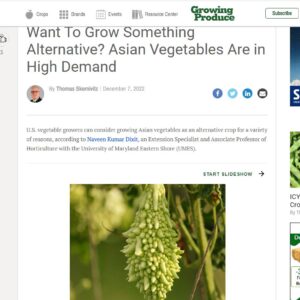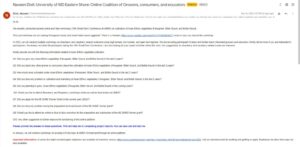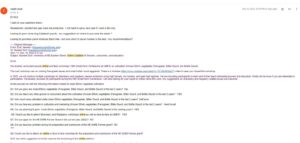Final report for SNE20-006-MD
Project Information
The Asian American population (20 million) has been consistently increasing for the last several decades in the USA and represents 5.6% of the total population. Similar growth is also observed on the Delmarva Peninsula (Delaware: 4.2%, Maryland: 7.7%, and Virginia: 10%). These immigrant populations create the demand for the cultivation of Asian Ethnic Vegetables (AEV). This demand provides an economic and crop diversification opportunity to local and small farm holders on the Delmarva Peninsula. However, Most of the AEVs are imported from the South American countries, are never fresh, and have minimum postharvest life. The top four most AEV consumed on a weekly basis are Bitter gourd, Bottle gourd, Fenugreek leaves, and Eggplant (small and round). However, limited information is available on the cultivation technology of these crops on the Peninsula. The current project demonstrated plasticulture technology for the cultivation of these AEVs to local growers, women farmers, veteran farmers, socially disadvantaged farmers, agriculture service providers, and backyard growers. Multiple field trials were conducted over a period of 2-year at the research and extension farm of the University of Maryland Eastern Shore (UMES). Stakeholder and agriculture service providers were invited to attend face-to-face workshops at the farm and through the online Zoom platform to learn the fundamentals of AEV cultivation and associated challenges. In addition, cooking workshops were also conducted and YouTube videos were created to learn how to cook these vegetables and subsequently teach other populations to further popularize these AEVs. Growers were also invited to show how adverse weather, soil type, and poor irrigation practices could cause crop failure to provide live learning experience during the cultivation of these crops at UMES. Educational material was provided to participants as a printed material and soft copy through the email. Each year AEV cultivation workshops were also conducted during the Annual Small Farm Conference at UMES to educate a large number of socially disadvantaged farmers on the Delmarva Peninsula. In addition, each year two AEV workshops were conducted for beginning veteran farmers at Therapeutic Alternatives of Maryland, Baltimore. Beginning farmers were also provided seedlings of AEVs to start cultivation of these vegetable crops. Individual farm demonstration events were also facilitated for interested beginning veteran farmers and agriculture service providers. The cultivation of these four AEVs is novel to the growers and agriculture service providers on the Delmarva Peninsula. Through this project, they learned techniques from sowing of seeds to provide the finally cooked product in the plate of the consumer for these four selected AEVs. Agriculture service providers and growers learned suitable conditions required for seed priming before sowing, raised bed preparation, fertilizer application and calculations, irrigation technology, trellis construction, identification of pests and managements, postharvest storage, and marketing and economics of AEVs production. Following these training and workshops at UMES, agriculture service informed that two farmers (woman veteran farmer and socially disadvantaged farmer) started growing AEVs on the Eastern Shore of MD. These vegetables are now visible in the local farmer market and consumers are asking for the year around supply. In the current year, more than 40 farmers showed interest in cultivation of Fenugreek in the current season (2023). Ag. Service providers and growers showed marketing challenges as AEV are initially imported from the South American countries and its difficulty to enter in the already existing market. However, Ag. Service providers suggested local growers to communicate with local Asian community organizations, places of worship, and target Asian community Facebook pages to invite these populations at the farm for demonstration and cookout. These approaches will help in advertisement of local availability of AEVs and promote local demand and sale.
Ten 'Ethnic Crop Team’ members who enrich their knowledge and skill of Asian Indian vegetables cultivation, management and cooking through this project will teach 15 farmers by incorporating information learned into fact sheets, workshops, field days, on-farm training, one-on-one consultations, and online training.
Agriculture Need:
Globalization of the economy caused significant immigration and changes in the demographic profile on the East Coast of the USA including the Delmarva Peninsula. Asian Populations dominate among other ethnic populations on the East Coast of the US. Asian populations grew by 72% between 2000 and 2015 (11.9 million to 20.4 million; https://www.pewresearch.org/fact-tank/2017/09/08/key-facts-about-asian-americans/). As per the 2010 US Census, Asian population constitutes 6.4%, 6.5%, and 2.1% of the total population in MD, VA, and DE (https://www.census.gov/programs-surveys/decennial-census/decade.2010.html ). This change in demography brings economic opportunities for local growers to cultivate Asian Indian vegetables. There is an economic demand for Asian Indian vegetables on the East Coast of the US worth $190 to $230 million per annum (Puduri and Govindasamy, 2011). In addition, the local restaurant and food industry demands specialty vegetables for new taste, flavor, and exotic demand from consumers. Most of the Asian Indian vegetables are perishable and cannot be stored or shipped for longer distances, which provides an important opportunity for our local growers to grow Asian Indian vegetables. Growers on the Delmarva Peninsula can take the advantage of sharing close proximity with Asian population-dominated areas in NY, NJ, and Washington, D.C. Consumers are well aware of the ‘Local Food-Local People-Local Health-Local Economy’ movement and willing to pay a premium price for a fresh and safe food supply. The purchasing power of American Asians is also high in comparison to other ethnic populations. Crop diversity on the Peninsula is restricted to row crops with inefficient phosphorus (P) uptake efficiencies; however, Asian Indian vegetables have higher P uptake from previous P application of animal waste. Cultivation of Asian Indian vegetables will not only bring functional food diversity, but also help in the reclamation of P-enriched soils on the Delmarva Peninsula. Changing weather patterns throughout multiple years becomes a new norm on the Delmarva Peninsula and causes crop failure and price volatility for row crops. Adoption of Asian Indian vegetables cultivation by small farmers will minimize the risks at the farm and subsequently increase the income. Most Asian Indian vegetables are imported from Mexico, Honduras, China, India, and other South American countries. Despite having a potential climate and market for these crops, our farmers were never trained for the cultivation of these vegetable crops. Some studies were conducted, but without using traditional/indigenous varieties, which were not accepted by ethnic populations due to differences in taste and quality. It is evident that our small growers on the Delmarva Peninsula are missing an important economic opportunity.
Proposed Solution:
I was awarded a Delmarva Grant for the development of an Annual plasticulture system for the Asian ethnic crop ‘Bitter Gourd’ (Momordica charantia L.). In addition, we will also develop plasticulture technology for the other three top most Asian Indian vegetables popular on the East coast e.g., Bottle gourd (Lagenaria siceraria (Mol.) Standl.), Fenugreek leaves (Trigonella foenum-graecum L.), and Eggplant (small and round; Solanum melongena L.). Indian varieties will be used to provide authentic Indian taste to accelerate the commercial demand. We will develop multidisciplinary ‘Ethnic Crop Team’ for this work includes horticulture faculty (development of cultivation practice), food and consumer science extension agent (demonstration of cooking and recipe development), vegetable entomologist (insect management), nutrient management advisor (development of nutrient plans for individual crop), urban agriculture agent (popularize crop among urban growers), Local NGO (train US service veterans), and local farmers (marketing in local farmer market). Our educational approach will involve classroom teaching, field demonstration, local farm visit, YouTube channel, live streaming through social media, cooking classes and recipes development, fact sheets, and sharing of resources on UMES ‘Horticulture Physiology’ Facebook Page. Under persistent COVID-19 situation, targeted Ag service providers will be engaged through available online platforms. Marketing of these vegetable crops will be facilitated with the help of local farmers, farmer market, ethnic grocery stores, and existing CSA.
Ag. Service Provider Interest:
An overview of current experiences of county extension agents and associates reflects their strength in the cultivation and management of local popular vegetables and row crops only. There is a complete lack of expertise for the cultivation of Asian Indian vegetables. This proposal was shared with several agent associates, senior agents, and local growers in the Tri-County area and nearby counties for its potential impact and need. Ag. Service Providers showed interest and willingness to participate in the development of this program and extension outreach. We are expecting to develop an ‘Ethnic Crop Team’ (10 or 12 trained extension personnel) and trained farmers during the two years of this project.
Advisors/Cooperators
Educational approach
Recruitment
'Ethnic Crop Team' recruitment was initiated during the development of this project. Regional Ag. service provider were communicated with the outline of this project. 8 Ag. service providers and 6 farmers showed willingness to join this team. With the progress of this project, current team members and PI communicated with the other Ag. service providers and growers to become the part of this project through media, personal contact, and face-to- consultation.
Surveys of service providers were conducted each year throughout the project and the above-mentioned information was collected and used to verify teaching actions. Service providers received handouts for recording their teaching actions with farmers. Following information was collected from Ag. Service providers and stakeholders.
I: How many farmers/growers attended workshops, field days, on farm trainings you conducted during the past year?
II: How many farmers showed interest to adapt annual plasticulture technology for Asian Indian vegetables?
III: What kind of questions were raised by the farmers during teaching and advising?
IV: What suggestions and recommendations were provided by the farmers?
V: What kind of limitations and obstacles were faced by the farmers?
VI: What they did to teach and advise farmers?
VII: How many email, telephone calls, and face-to face advice was given to interested growers?
Education
Each year more than four-extension events were organized (Cooking Out Veggies Day), (Bitter Gourd Day/Fenugreek Day), (Bottle Gourd Day/Eggplant Day), and (Veggies Budget Day) at UMES. In addition to the above mentioned four workshops, two more workshops were also conducted for US service veterans in Baltimore in association with NGO, TALMAR.
Educational approaches at each event included a classroom presentation followed by the vegetable plot visit. All the practical training was conducted at UMES experimental vegetable plots to observe the various phases of vegetable development, constraints faced, and their management solutions. YouTube videos were generated for AEVs cooking to reach interested stakeholders or interested parties across the state and country. In addition, online platform 'Zoom' was also used for the conductance of online workshops to avoid Covid-19 infection under UMES guidelines. Interested individual participants were also demonstrated the cultivation of AEVs at UMES research and extension farm. Moreover, Community members were also invited to participate in AEVs harvesting events to interact with local farmers. Community members were selected to participate in AEVs cooking events to teach local growers and Ag. service providers. These two events facilitated consumer-farmer-educator interaction to promote local consumption, local production, and local education on the Delmarva Peninsula. Ag. Service providers across the state were also demonstrated in the AEVs trials at UMES to further popularize the cultivation of these crops in different parts of the MD. Printed and online material (cultivation technology) was provided to attendees after each workshop and through email communication. PowerPoint and workshop videos were uploaded on 'YouTube Channel' and UMES-Extension Facebook Page. Up-to-date information on Asian Indian vegetable cultivation will be disseminated to the participants during the successive years after the completion of this project.
Following AEVs cultivation aspects were taught during the two year period of this work.
I: Understanding of climatic and soil factors essential for Asian Indian vegetable cultivation.
II: Selection of Indian varieties suitable for Delmarva Peninsula.
III: Raised bed preparation.
IV: Trellis design.
V: Fertigation, irrigation, and pest management.
VI: Harvesting stages and marketing approaches.
VII: Cooking and popular recipes for Asian Indian vegetables.
VIII: Developing enterprise budget for small-scale Asian Indian vegetable enterprise and record keeping.
IX: Promotion of Farmer-consumer-educator interaction.
X: Use of Brillion seeder and raised bed machine for the cultivation of AEVs.
XI: Seed priming.
XII: Seed sources
XIII: Communication with local Asian American organizations and places of worship.
All these topics were discussed during the funded two years and within each year an overview was provided to refresh the past learning outcomes. This approach helped the new service provider/growers to catch up with current topics.
Team members were provided individual consultation and advice to interested growers. In addition, team members were provided with AEV seedlings to grow the crop in different parts of the MD. Team members were also provided online study material for teaching and sharing with the targeted audience. In fact, ethnic crop seed companies were provided with the information of seed production (self pollinated crop) and bulk seed sources.
Verification
Following information was collected from Ag. service providers.
I: Number of farmers/growers attended workshops, field days, on farm training, and workshops on Zoom platform.
II: Number of farmers showed interest to adapt annual plasticulture technology for Asian Indian vegetables.
III: Number of farmers currently growing AEVs.
III: Questions raised by the farmers during teaching and advising (Source of seeds, machinery required for AEV cultivation, local marketing, possibility of cooking demonstration in farmer market, grants available for the cultivation of these novel crops, and local seed production)
IV: Farmers suggested and recommended to Ag. Service providers to provide information on availability/renting possibilities of seed drill and bed raised machine.
V: Ag. Service providers communicated that the major concern of the famers is 'how to develop the local market for AEVs'.
VI: Ag. Service providers and local growers provided printed/online educational material to local growers. They also suggested interested growers to start the cultivation of AEVs in small plot.
VII: Record of email, telephone calls, and face-to face advice to AEV growers/interested participants was maintained and shared for reporting.
X: Ag. Service providers also reported that local growers also inquired about the next NE-SARE grant writing workshop.
Milestones
8 Agriculture service providers and 6 farmers will be invited to attend ‘Cooking Out Veggies Day’ (October 2020) at UMES to visit ‘Bitter Gourd’ experimental trial and learn how to cook bitter gourd vegetable. This cooking demonstration will help stakeholders to share recipes with consumers to popularize and accelerate the sale of bitter gourd. Interested parties will be encouraged to participate in the projects during the spring (April 2021) education programs for the cultivation and management of bitter gourd and bottle gourd. Recruitment of ‘Ethnic Crop Team’ will also be undertaken during this workshop. Selected ‘Ethnic Crop Team’ members are expected to provide individual consultation and advice to vegetable growers. Members can also facilitate UMES vegetable plots visit to interested parties. Interested parties will be communicated before each workshop to join the ‘Ethnic Crop Team’ through emails, personal contact, and with the help from extension agents. New team members who will join the project at later stages will receive previous educational materials (factsheet, videos, face-to-face consultation) to keep pace with the project.
6
8
26
2
August 10, 2021
Completed
August 28, 2021
1: Easy and simple cooking recipes were developed for the local growers to cook bitter and bottle gourd and teach consumers.
2: Two YouTube videos were created.
a: https://www.youtube.com/watch?v=NtIfPhOZZi8
b: https://www.youtube.com/watch?v=TV45Kh17uno&t=53s
3: Community members participated in conducting cooking class for bitter and bottle gourd to local growers. Its an example of Community-Farmer collaboration.
An ‘Ethnic Crop Team’ of 10-12 service providers will be recruited from highly interested and committed agricultural service providers for a period of two year during ‘Bitter Gourd Day’ (April 2021). Members of ‘Ethnic Crop Team’ (10-12) and 10 or more farmers sign up for the program will participate in the second workshop during ‘Bitter Gourd Day’ and learn about the fundamentals of climate, soil, site preparation, selection of varieties, formation of raised beds, and trellis design for bitter gourd and bottle gourd cultivation. Team and growers will also be invited for next workshop in July 2021. New team members who will join the project at later stages will receive previous educational materials (factsheet, videos, face-to-face consultation) to keep pace with the project.
10
10
35
2
April 10, 2021
Completed
April 24, 2021
1: Information was shared on high yielding varieties of bitter and bottle gourd.
2: Simple trellis was developed for bitter gourd cultivation using inexpensive and easily available material.
3: Raised bed size, crop geometry, and liquid fertilizer application was explained to the local growers.
4: Educational material was provided in the form of a PowerPoint presentation.
Members of ‘Ethnic Crop Team’ (10 or 12) and 15 or more farmers will participate in the third workshop during ‘Bottle Gourd Day’ (July 2021) at UMES. Participants gain knowledge about the fertigation, irrigation, pest management, and harvesting of bitter gourd and bottle gourd. Team and growers will also be invited for next workshop in September 2021. New team members who will join the project at later stages will receive previous educational materials (factsheet, videos, face-to-face consultation) to keep pace with the project.
15
12
34
2
July 10, 2021
Completed
May 22, 2021
1: Growers and agricultural service providers learned about the stages of fruit development and harvest.
2: Information was provided on local pests and pathogens and use of both organic and conventional pesticides.
3: Growers also learned shade induced fruit disorders in bitter gourds.
4: Growers were taught how to calculate liquid fertilizer doses for fertilizer injector.
Members of ‘Ethnic Crop Team’ (10 or 12) and 18 farmers will participate in the fourth workshop during ‘Veggies Budget Day’ (September 2021) at UMES. Participants learn about budget preparation and market strategies for the sale of Asian Indian vegetables. In addition, cooking class for bottle gourd preparation will also be conducted. Members of team (10 or 12) and farmers who patriciate in the earlier workshops responds to annual verification to report on teaching and assistance about cultivation of Asian Indian vegetables biter gourd and bottle gourd. Members will also be invited for next workshop in October 2021. New team members who will join the project at later stages will receive previous educational materials (factsheet, videos, face-to-face consultation) to keep pace with the project.
18
12
11
3
September 25, 2021
Completed
September 04, 2021
1: One woman veteran farmer cultivated bitter gourd in 1/2 acre in 2021.
2: Bitter and bottle gourd sales are promoted by selling these vegetables in the local farmer market.
3: One Grocery store owner is ready to buy bitter and bottle gourd from local growers.
4: Local Asian community showed a positive response by purchasing bitter and bottle gourd from local growers. Community also reported that these vegetables are fresh and more tasty in comparison to imported ones.
5: One local growers got recommendation from a wholesale distributor to grow different kinds of Asian vegetables (Red Carrot and Tinda) and showed readiness to purchase in the next season.
6: Major challenge faced by growers is to further explore Asian vegetable market as wholesale distributors already have contracts from farmers of other states and countries.
Members of Ethnic Crop Team’ (10 or 12) and farmers will be contacted quarterly about the latest information and developments in our vegetable trials and asking if they have any questions and need assistance or more information. Online study material will also be provided about the Asian Indian vegetable cultivation and Q&A session will be organized after each workshop. Members will also be invited for next workshop in October 2021.
18
12
6
1
September 30, 2021
Completed
December 01, 2021
1: 1 Growers showed concern about the availability of market.
2: 3-Farmers asked about the local source of seeds for bitter gourd to grow during the next season.
3: Educational material for the cultivation of bitter and bottle gourd provided online.
Members of Ethnic Crop Team’ (10 or 12) and 18 farmers will be invited to attend UMES 18th Small Farm Conference (November 2021) at UMES to demonstrate bitter and bottle gourd fruit cultivation and distribute educational material. Interested parties will be encouraged to participate in the projects spring (April 2022) education programs for the cultivation and management of fenugreek and eggplant. New team members who will join the project at later stages will receive previous educational materials (factsheet, videos, face-to-face consultation) to keep pace with the project.
18
12
9
3
October 30, 2021
Completed
November 11, 2021
1: 4 new socially disadvantaged farmers showed interest in growing bitter gourd during the next season.
2: Growers asked about the cultivation technology of Fenugreek leaves.
3. Growers also inquired how to cook Fenugreek leaves and its medicinal properties.
An ‘Ethnic Crop Team’ of 10-12 service providers and 20 farmers will participate in the second workshop during ‘Fenugreek Day’ (April 2022) and learn about the fundamentals of climate, soil, site preparation, selection of varieties, formation of raised beds, and trellis design for fenugreek and eggplant cultivation. Team and growers will also be invited for the next workshop in July 2022. New team members who will join the project at later stages will receive previous educational materials (factsheet, videos, face-to-face consultation) to keep pace with the project.
20
12
6
2
October 15, 2022
Completed
October 15, 2022
- Fenugreek Fled day was attended by large number (55) of Asian American families and they interacted with local growers.
- Asian American consumers showed interest in purchase of locally grown Fenugreek leaves.
- Importance of seed drill and sprinkler irrigation was shown for the cultivation of Fenugreek.
- Growers learned how to grow Fenugreek under heavy soils and what precautions one must take during drought and frost periods.
- Growers also learned about the management of common weeds such as Jimson weed.
- Information on available varieties (SKU-49966) of Fenugreek seeds was provided to growers.
- Percent germination for Fenugreek seeds and seed rate calculation was taught.
- Educational material was provided in the form of a PowerPoint presentation.
-
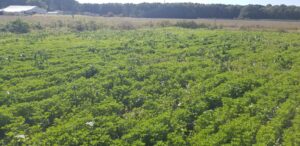
Fenugreek 60 days after sowing 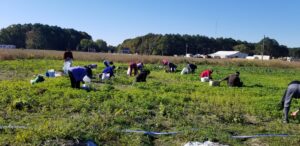
Fenugreek Day: Harvesting of Fenugreek
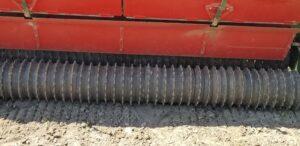
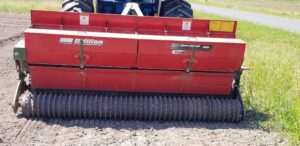
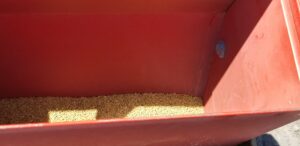
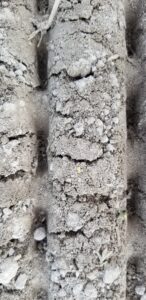
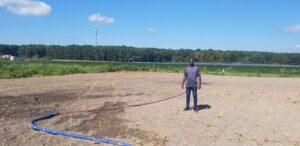
Members of ‘Ethnic Crop Team’ (10 or 12) and 22 or more farmers will participate in the third workshop during ‘Eggplant Day’ (July 2022) at UMES. Participants gain knowledge about the fertigation, irrigation, pest management, and harvesting of fenugreek and eggplant. Team and growers will also be invited for next workshop in September 2022. New team members who will join the project at later stages will receive previous educational materials (factsheet, videos, face-to-face consultation) to keep pace with the project.
22
12
7
2
October 22, 2022
Completed
October 22, 2022
This workshop was conducted using the Zoom platform. Cultivation of Indian round small eggplant was not communicated due to multiple failures of seed germination under greenhouse regimes, therefore crop was not cultivated in field conditions. However, Fenugreek cultivation information was provided.
- Broadcast application fertilizer was recommended for small farm owners who lack specialized equipment.
- Farmers were taught about the requirements of specific Rhizobium species (Sinorhizobium meliloti) for the formation of nodules in Fenugreek leaves. Host-Rhizobium specificity and association was also discussed.
- Inexpensive sources of Rhizobium purchase were shared with the participants.
- Seed and bacterial inoculation before sowing was taught to enrich soil N in association with cultivation of leafy vegetable Fenugreek.
- Farmers were taught to never treat Fenugreek as a cover crop if the main aim is to harvest leaves for vegetable purposes. This crop will fail if proper care (Irrigation/Fertilizer/Weed Management) is not given.
- Farmers learned that they can harvest Fenugreek crops 3-times per year.
- Farmers learned this crop will fail under rainfed conditions.
- Growers learned irrigation by flooding is not suitable for the cultivation of Fenugreek as this crop is sensitive to waterlogging.
- Growers learned the frost tolerance nature of Fenugreek and they can cultivate this crop up to the last week of November on the Delmarva Peninsula.
- Growers learned Fenugreek can be grown organically as there was no economic pest and pathogen attack on this crop.
- Farmers were taught to use a higher seed rate of 25 lbs/A for Fenugreek to suppress weed seeds growth. This crop is not carrying a gene for herbicide resistance.
- Educational material was provided in the form of a PowerPoint presentation.
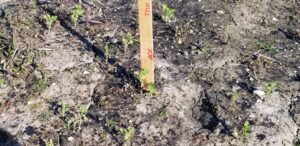
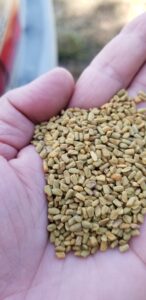
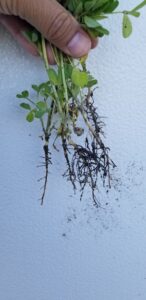
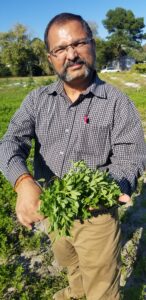
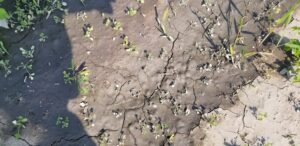
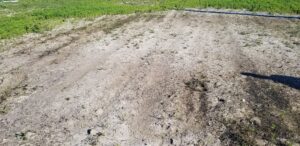
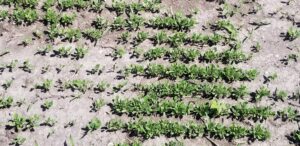
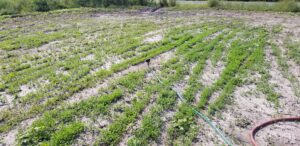
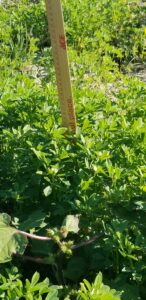
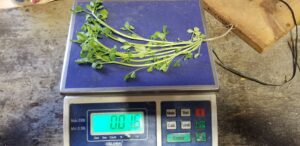
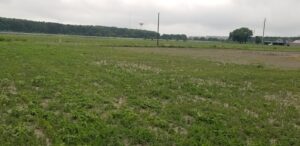
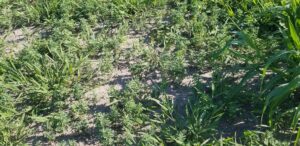
Members of ‘Ethnic Crop Team’ (10 or 12) and 25 farmers will participate in the fourth workshop during ‘Veggies Budget Day’ (September 2022) at UMES. Participants learn about budget preparation and market strategies for the sale of Asian Indian vegetables. In addition, cooking class for eggplant preparation will also be conducted. Members of team (10 or 12) and farmers who patriciate in the earlier workshops responds to annual verification to report on teaching and assistance about cultivation of Asian Indian vegetables fenugreek and eggplant. New team members who will join the project at later stages will receive previous educational materials (factsheet, videos, face-to-face consultation) to keep pace with the project.
25
12
35
5
April 30, 2022
Completed
November 18, 2022
This workshop was conducted twice using the Zoom platform and during the 19th Small Farm Conference.
1: An enterprise budget for the cultivation of Fenugreek was developed based on inputs and current price of market sale.
2: Growers (15) showed interest in growing Fenugreek in the next season (2023) by learning the information on current demand and the higher price of crop sale with minimum inputs.
3. Cooking of Fenugreek and Indian small round eggplant was materialized with help of the Asian American community.
4: A YouTube video was created for simple and easy cooking of these vegetables so that growers can learn and demonstrate to other populations/consumers at farm, local farmer markets, and other avenues of local sale.
5. Cooking with Fenugreek and Small Round Eggplant. UMES YouTube Channel (11/21/2022). UMES, Princess Anne, MD (Number of views: 48). https://www.youtube.com/watch?v=YV1KK4KXbCY6. Growers showed interest in medicinal properties of Fenugreek. Literature based data on medicinal use of Fenugreek was shared with growers.
6. The demand of AEV in the US vegetable market was communicated with the farmers of the nation by National vegetable magazine.
Growing Produce: Want to grow something alternative? Asian vegetables are in high demand (12/7/2022). https://www.growingproduce.com/vegetables/how-about-something-alternative-asian-vegetables-in-high-demand/
7. Growers were suggested to communicate with local Asian American Associations and places of worship in their communities to promote the sale of locally grown AEVs.
8. Educational material was provided in the form of a PowerPoint presentation and YouTube Video


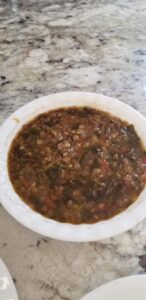
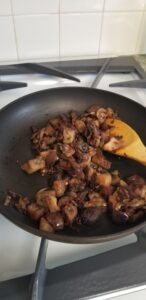
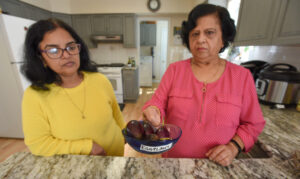
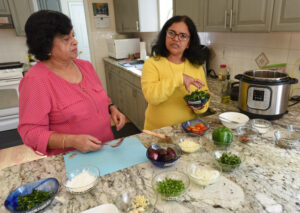
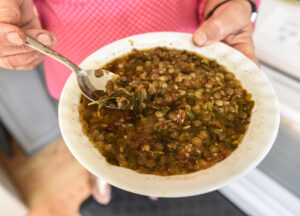
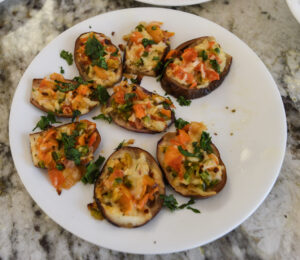
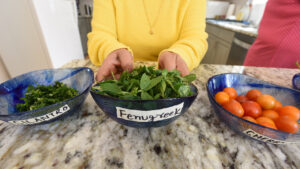
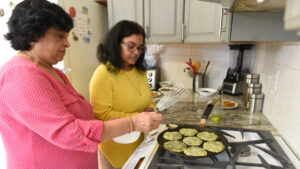
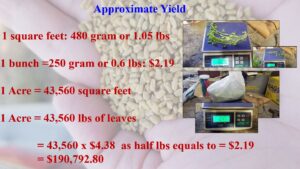
Members of Ethnic Crop Team’ (10 or 12) and 25 farmers will be contacted quarterly about the latest information and developments in our vegetable trials and asking if they have any questions and need assistance or more information. Online study material will also be provided about the Asian Indian vegetable cultivation and Q&A session will be organized after each workshop.
25
12
12
4
September 30, 2022
Completed
December 16, 2022
Ag. educators and growers on the Delmarva Peninsula shared the following information regarding cultivation of AEV.
1: Most of the growers showed interest in growing Fenugreek and Bitter gourd.
2: Currently, 3 growers are cultivating AEV (Bitter Gourd) and many (15) showed interest in growing Fenugreek next year after attending multiple AEV cultivation workshops through my NE-SARE PDP at UMES.
3. 50% growers showed interest in attending online NE SARE farmer grant writing workshops and 50% wanted to attend face-to face workshops.
4. Farmers also communicated about the problems of AEV marketing. According to farmers, there is already an AEV import market and it is not easy to enter this existing market.
5. Growers inquired about the local sources of AEV seeds.
Each year one workshop will be conducted at TALMAR to Educate US Service veteran to cultivate Asian Indian vegetables in Baltimore area of MD.
8
1
13
1
September 06, 2021
Completed
June 10, 2022
Beginning veteran farmers were trained for the cultivation of AEVs through two (4/27/2022 and 6/10/2022) face-to-face workshops at TALMAR, Baltimore.
1: Beginning veteran farmers learned the importance of their farm location near NY, NJ, and Washington, D.C. area where the thickest population of Asian Americans reside. These vegetables (Bitter Gourd, Bottle gourd, and Fenugreek) are in demand on a weekly basis.
2. One woman veteran farmer showed interest in growing Dwarf apple (2017-2019 NE SARE PDP), Bitter gourd and Fenugreek in Reisterstown, MD. She also visited UMES AEV demonstration plots (10/15/2022).
3. Educational material was provided in the form of a PowerPoint presentation.
4. Beginning veteran farmers learned that these vegetables are suitable for urban agriculture. These vegetables are high yielding and require minimum space.
5. Detailed information provided on cultivation practices (seed source, seed germination requirements, soil preparation, trellis, fertilizer and irrigation requirements, and common pest and pathogens) of AEVs.
6. Farmers were also provided information on the NE-SARE farmer grant.
Milestone activities and participation summary
Participation summary:
Learning Outcomes
Email communication was used to verify the changes in knowledge, attitudes, and skills for the cultivation of Asian ethnic vegetables.
1: Growers used high yielding varieties of bitter gourd for cultivation.
2: Growers looking for more local farmers markets and wholesale distributors in different counties to accelerate the sale of these vegetables.
3: Growers used simple trellis for the cultivation of bitter gourd.
4: Growers used both initial broadcast and later liquid fertilizer applications to raise these crops.
5: Growers showed a positive response to diversify crop cultivation using Asian ethnic vegetables.
6: Growers learned skill to cook these vegetables without using special spices.
7: Growers learned simple fertilizer calculations to use fertilizer judicially.
8: Multiple growers (10) showed interest in growing Fenugreek in the next season (2023).
9: Three farmers are currently growing Bitter gourd (total 1.5 acre) after attending workshop through NE SARE PDP.
10: One commercial seed company looking for the marketing of AEV seeds after reading AEV cultivation program at UMES in 'Growing Produce. magazine.
11: Larger number (45) of growers requested educational material on the cultivation of AEVs (Bitter gourd, Bottle gourd, and Fenugreek).
Performance Target Outcomes
Performance Target Outcomes - Service Providers
Target #1
Ten Ethnic Crop Team members who enrich their knowledge of Asian Indian vegetable cultivation, management and cooking through this project will teach 15 farmers by incorporating information learned into fact sheets, workshops, field days, one-on-one consultations, and online training.
10-15 Acre
| Year 1 | Year 2 | Year 3 |
|---|---|---|
| 2 | 2 | 0 |
| Year 1 | Year 2 | Year 3 |
|---|---|---|
| 5 | 4 | 0 |
| Year 1 | Year 2 | Year 3 |
|---|---|---|
10-15 acre |
10-15 Acre |
0 |
| Activity | Year 1 | Year 2 | Year 3 | Total |
|---|---|---|---|---|
| Curricula, factsheets and other educational tools | 3 | 3 | 0 | 6 |
| Consultations | 8 | 10 | 0 | 18 |
| On-farm demonstrations | 1 | 2 | 0 | 3 |
| Online trainings | 1 | 1 | 0 | 2 |
| Tours | 1 | 2 | 0 | 3 |
| Workshops and field days | 1 | 1 | 0 | 2 |
35 Ag. Service providers were communicated for the verification of performance outcomes through email and telephone call. 4 Ag service providers responded and educated 9 farmers through printed and online educational material provided by the PI. Ag. service providers conducted workshops, face-to-face consultations, visits to UMES AEVs plots, provided online educational material, and participation in AEV harvesting events. The less number of responses are mainly due to the novel nature of these crops and marketing constraint, which restricts growers for the cultivation of these crops, therefore getting responses from farmers may be a challenge for Ag. service providers.
Additional Project Outcomes
| Year 1 | Year 2 | Year 3 | Total |
|---|---|---|---|
| 1 | 1 | 0 | 2 |
SARE Outreach
SARE Outreach Plan
I am responsible for the organization of multiple extension and outreach events through the UMES extension program. These events will provide a platform to share and communicate SARE program to growers, farmers, extension educators, and agriculture service providers. In addition, all my research grants include an extension component, which will be utilized for the dissemination of SARE program benefits to the farmers. Following is the list of events when information on SARE grant opportunities were provided to the growers and Ag. service providers.
- UMES Bitter Gourd Fruit Demonstration: Cultivation Technology/Educational Material Provided to Small Farmers. UMES 18th Small Farm Conference. (11/5/2011-11/6/2021) UMES, Princess Anne, MD (Number of participants: 10).
- SARE Farmer Grant Opportunities for Local Growers: Upcoming USDA-SARE Grants and Assistance Available. UMES 18th Small Farm Conference. (11/6/2021) UMES, Princess Anne, MD (Number of participants: 16).
- SARE Grant Writing Workshop: Tips for successful SARE- Farmer grant1Writing to Local Growers: UMES 18th Small Farm Conference. (11/6/2021) UMES, Princess Anne, MD (Number of participants: 07).
- Bitter Gourd Cultivation Workshop Onsite: Basics of bitter gourd cultivation. 9/4/2021. UMES, Princess Anne, MD (Number of participants: 06).
- Bottle Gourd Cultivation Workshop Onsite: Basics of bottle gourd cultivation. 9/4/2021. UMES, Princess Anne, MD (Number of participants: 14).
- SARE-Farmer Grant Opportunities for Growers in NE USA. Basic information on grant submission requirements. Presented by Candice Huber, NE SARE Grant Program Coordinator. (8/28/2021). UMES, Princess Anne, MD (Number of participants: 28)
- SARE Asian Ethnic Vegetable Cultivation Workshop for US Service Veterans (Group-1): Cultivation of vegetables, training, fertigation, and diseases management. (7/1/2021) Therapeutic Alternatives of Maryland, Baltimore, MD. (Number of participants: 3).
- SARE Asian Ethnic Vegetable Cultivation Workshop for US Service Veterans (Group-1): Cultivation of vegetables, training, fertigation, and diseases management. (6/30/2021) Therapeutic Alternatives of Maryland, Baltimore, MD. (Number of participants: 5).
- SARE Farmer Grant Opportunities for Local Growers: Profiting From A Few Acres Conference. Delaware State University Small Farm Conference. Online Workshop. (3/10/2022). (Number of participants: 45).
- Eastern Shore Vegetable Growers Meeting. Cultivation of Asian Ethnic vegetables. 2/16/2022. Cambridge, MD. (Number of participants: 10).
-
NE SARE Asian Ethnic Vegetable Cultivation Workshop for US Service Veterans (Group-1): Cultivation of Bitter Gourd, training, fertigation, and diseases management. (06/10/2022) Therapeutic Alternatives of Maryland, Baltimore, MD. (Number of participants: 8).
-
NE SARE Asian Ethnic Vegetable Cultivation Workshop for US Service Veterans (Group-1): Cultivation of Fenugreek, training, fertigation, and diseases management. (06/10/2022) Therapeutic Alternatives of Maryland, Baltimore, MD. (Number of participants: 8).
-
NE SARE Farmer Grant Writing Workshop-I. Basics of Farmer Grant Writing. (Online: 10/22/2022). UMES, Princess Anne, MD (Number of participants: 11).
-
NE SARE Asian Ethnic Vegetable (AEV) Workshop. Fenugreek/Methi cultivation, diseases, fertigation, and economics (10/21/2022). UMES, Princess Anne, MD (Number of participants: 9).
-
NE SARE Asian Ethnic Vegetable (AEV) Workshop. Fenugreek/Methi cultivation demonstration and harvest indices (10/15/2022). UMES, Princess Anne, MD (Number of participants: 51).
-
NE SARE Asian Ethnic Vegetable (AEV) Workshop. Cooking of Methi/Small Round Indian Eggplant Vegetables (11/18/2022). UMES, Princess Anne, MD (Number of participants: 7).
-
NE SARE Asian Ethnic Vegetable (AEV) Cultivation Technology for Fenugreek/Methi. UMES 19th Small Farm Conference (11/5/2022). UMES, Princess Anne, MD (Number of participants: 30).
-
NE SARE Asian Ethnic Vegetable (AEV) Cultivation Technology for Bitter Gourd: Cultivation Technology/Educational Material Provided to Small Farm Owners. UMES 19th Small Farm Conference (11/4/2022-11/5/2022). UMES, Princess Anne, MD (Number of participants: 28).
-
NE SARE Asian Ethnic Vegetable (AEV) Cultivation Technology for Bottle Gourd: Cultivation Technology/Educational Material Provided to Small Farm Owners. UMES 19th Small Farm Conference (11/4/2022-11/5/2022). UMES, Princess Anne, MD (Number of participants: 28).
-
NE SARE Asian Ethnic Vegetable (AEV) Cultivation Technology for Fenugreek: Cultivation Technology/Educational Material Provided to Small Farm Owners. UMES 19th Small Farm Conference (11/4/2022-11/5/2022). UMES, Princess Anne, MD (Number of participants: 28).
-
Small Farm Owner Recruitment for NE SARE Training Project on Strawberry and Raspberry Season Extension. UMES 19th Small Farm Conference (11/4/2022-11/5/2022). UMES, Princess Anne, MD (Number of participants: 28).
Five NE SARE farmer grant writing workshops were conducted to educate local farmers about the basics and requirements of successful
1. SARE Farmer Grant Opportunities for Local Growers: Upcoming USDA-SARE Grants and Assistance Available. UMES 18th Small Farm Conference. (11/6/2021) UMES, Princess Anne, MD (Number of participants: 16).
2. SARE Grant Writing Workshop: Tips for successful SARE- Farmer grant Writing to Local Growers: UMES 18th Small Farm Conference. (11/6/2021) UMES, Princess Anne, MD (Number of participants: 07).
3. SARE Farmer Grant Opportunities for Local Growers: Profiting From A Few Acres Conference. Delaware State University Small Farm Conference. Online Workshop. (3/10/2022). (Number of participants: 45).
4. NE SARE Farmer Grant Writing Workshop-I. Basics of Farmer Grant Writing. (Online: 10/22/2022). UMES, Princess Anne, MD (Number of participants: 11).
5. NE SARE Farmer Grant Writing Workshop-II. Basics of Farmer Grant Writing. (Online: 10/29/2022). UMES, Princess Anne, MD (Number of participants: 4).
All these events were attended by the farmers, growers, stakeholders, farm managers, and extension educators. Sustainable agriculture practices in selected fields of farming were disseminated through a variety of tools.
